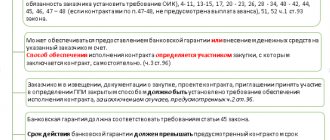Subject of regulation
Art.
94 44-FZ with comments describes what needs to be done after concluding a contract in order to achieve the goal for which the government order was carried out. Stages of contract execution:
- Acceptance.
- Payment.
- If necessary, change or termination.
Acceptance
The supplier is obliged to promptly provide the customer with reliable information about the progress of fulfillment of obligations, incl. about emerging difficulties. And by the deadline specified in the contract, he must provide the results of the purchase. The customer's responsibilities include:
- provide acceptance;
- conduct an examination both on your own by involving officials (you can create an acceptance committee of at least 5 people), and with the involvement of experts on the basis of contracts concluded in accordance with 44-FZ.
- return the money to the supplier (ensure the execution of the contract) under the conditions specified in the contract.
As for the examination, the involvement of experts or expert organizations is mandatory in cases of ordering from a single supplier when purchasing under paragraphs 10-13, 16, 24 (to meet federal needs), 27, 31, 34, 35, 37-39, 43, 49 art.
93 (supply of cultural property, works of literature and art, goods produced by institutions of the penal system, acquisition of non-residential buildings, etc.). Expertise is not required for orders for the execution of design documentation for a capital construction project, engineering surveys with mandatory state and non-state expertise, and for the procurement of expert services.
The result of this stage is an acceptance document or a document of refusal of acceptance with justification of the reasons. If expert organizations were involved, also an expert opinion (may contain proposals to eliminate violations that do not impede acceptance, including indicating the deadline for their elimination).
Payment
Payment is made by the customer in the manner and within the terms specified in the contract.
Change or termination of contract
The procedure is determined by Art. 95 44-FZ.
The customer reflects the results of the execution of the contract or its individual stages, as well as violations or non-fulfillment of the contract in the report. It must be placed in the Unified Information System within 7 days from the date of payment, signing of the acceptance document, amendment or termination of the contract. The report is not prepared in cases of procurement in accordance with clauses 4, 5, 23, 42, 44, 46, part 1 93. Additionally, the customer places the report in regional and municipal information systems. The report form is established by Resolution No. 1093 dated November 28, 2013.
Article 94 Federal Law-44 “Features of contract execution”
Federal Law No. 44-FZ “On the contract system in the field of procurement of goods, works, services to meet state and municipal needs” regulates the procedure for procurement, concluding contracts and their implementation. The contents of the document are divided into 8 chapters, which include 114 articles. This publication will examine in more detail Article 94 of Federal Law-44 “Features of contract execution,” which contains 12 points.
Clause 1. Implementation of the contract includes a whole range of measures carried out after the conclusion of the contract. They are aimed at achieving certain procurement objectives, which can be achieved through interaction between the customer and the supplier in accordance with civil legislation and the relevant Federal Law, including:
- acceptance of the delivered goods, work performed and its results, services provided, as well as individual stages regarding the delivery of goods, which are provided for in the agreement. This list also includes conducting an examination of the delivered goods;
- monetary payment by the customer for the goods supplied, the work performed and its results, the services provided and certain terms of the agreement;
- positive interaction between the customer and the supplier.
Clause 2. According to all the terms of the contract, the supplier (contractor or performer) undertakes to provide reliable information about the progress of fulfilling its obligations on time, arising during the execution of the contract.
Clause 3. In order to verify the reliability of the results provided by the supplier, the customer must conduct a special examination of the results of the contract execution in accordance with 44-FZ.
Clause 4. The customer must involve experts and expert institutions in conducting an examination of the goods supplied, work performed or services provided, except for the following cases:
- preset by paragraphs 1-9, 14, 15, 17-23, 24;
- implementation of procurement of services of experts and expert institutions.
Clause 4.1. The Administration of the Russian Federation has the right to determine other cases of mandatory examination.
Clause 5. In order to conduct an appropriate examination of the delivered goods, expert institutions may request additional information from the customer or supplier.
Clause 6. According to the customer’s decision, an acceptance committee consisting of at least 5 people can be established to accept the delivered goods, work performed or services provided, the results of a separate stage of contract execution.
Clause 7. Acceptance of the results of individual stages of execution of the contract is carried out in a certain order and within the time limits established by the contract.
Clause 8. The customer has the authority not to refuse to accept the results of a particular stage of execution of a government contract under 44-FZ or the delivered goods, if this discrepancy does not interfere with the acceptance of the corresponding results.
Read the Gas Supply Law
Clause 9. The result of a separate stage of contract execution, information about the goods supplied, work performed or service rendered must be reflected in a report that is posted in the unified information system, containing the following information:
- on the execution of the contract, on compliance with intermediate and final deadlines for the execution of the contract;
- about improper execution of the contract;
- on termination of the contract during its execution.
Clause 10. To the above report, the customer must attach a conclusion based on the results of the examination of a separate stage of contract execution.
Clause 11. The procedure for preparing and posting in the unified information system of the report mentioned in part 9 of this article, the form of the said report is determined by the Government of the Russian Federation.
Clause 12. The state power service of objects of the Russian Federation and the local government service have the right to independently establish the procedure for posting reports on the results of a particular stage of contract execution.
The latest amendments and additions to Article 94 of Federal Law No. 44 were made on July 7, 2021. The changes affected clause 1 of part 4 of article 94. According to the new wording, when making procurements to supply federal bodies, part 50 of part 1 of article 93 of the relevant law was included.
What do you know about Article 34 of Law 44 and the bank guarantee under 44 Federal Law?
Resolution of the Arbitration Court of the North-Western District dated September 7, 2018 N F07-11130/2018 in case N A42-7716/2017
The Supplier filed a lawsuit against the Customer for an obligation to accept the goods. The courts of first and appellate instances rejected the claim. The supplier filed a cassation appeal in court, citing the courts' incorrect application of substantive and procedural law.
The supplier referred to the fact that he supplied the goods of proper quality; the evidence available in the case materials does not refute this. In particular, in the opinion of the Supplier, the explanations given in court by a specialist who is an employee of the defendant should not be taken into account.
The court found that as a result of the electronic auction, the Customer and the Supplier entered into an agreement, under the terms of which the Supplier agreed to supply the goods, and the Customer agreed to accept and pay for it. According to the provisions of the contract, the Customer accepts the goods, during which he is obliged to conduct an examination.
In fulfillment of obligations, the contractor delivered the goods, which is confirmed by invoices. The Customer carried out an examination of the goods; based on the calculations made by the Customer’s specialist, it was concluded that the quality of the goods did not meet the requirements of regulatory documents. The Customer drew up an acceptance certificate, in which he indicated the inadequate quality of the goods, refused acceptance and sent a claim to the Supplier about the non-compliance of the delivered goods with the specification, with a requirement to replace the low-quality goods with high-quality ones.
Believing that the Customer is unlawfully evading acceptance of the goods, the Supplier sent a pre-trial claim to him demanding acceptance and payment for the goods. The claim was left unsatisfied, after which the case went to trial.
According to the Supplier, the buyer unlawfully evades acceptance and payment for the goods. To substantiate its position, the Supplier referred, among other things, to the fact that the courts unlawfully accepted the Customer’s evidence in the form of a conclusion from a specialist who was his employee. The Supplier also petitioned for an expert examination to be ordered by the court.
Having considered the case, the cassation court upheld the decisions of the previous courts and explained that both the provisions of Federal Law No. 44 and the provisions of the agreement concluded between the parties allowed the examination to be carried out by the Customer. The Customer did not provide evidence of non-compliance of the goods with the requirements established in the Contract. The Supplier's argument to order an expert examination by the court was rejected.
Creation order
The need to create an acceptance commission is indicated by Part 6 of Article 94 of the Federal Law “On the contract system in the field of procurement of goods, works, services to meet state and municipal needs” No. 44-FZ.
In accordance with the requirements of the above Federal Law, the commission must be created before the actual acceptance of the results of the contract.
As a rule, such a commission is either created by the customer at the very beginning of its procurement activities, or at the beginning of each year, provided that there is a need to review the composition of such a commission.
The legitimacy of such a commission is consolidated on the basis of the following local legal acts:
- order on the creation of a commission for accepting the results of execution of contracts and agreements;
- Regulations on the work of the commission.
Order form
If we talk about what exactly should be indicated in the order, then there is no strict form for this document - the execution depends entirely on the procedure that is used in a particular organization - a state or municipal customer. If we talk about the list of information that should be reflected in the text of such a document, then these include:
- information about the composition of the commission . Due to the fact that some members of the main composition of the commission may be absent for valid reasons, the text of the order must indicate the employees included in the main and replacement compositions;
- data on those regulatory documents on which such a commission must rely in the course of carrying out its activities (as part of the order on the creation of an acceptance commission, the approval of the Regulations on the activities of such a commission can also be carried out);
- rules for bringing to the attention of members of the commission the provisions of those regulatory documents on which they must rely when carrying out their activities;
- the date of signing the order and the mark on the approval of such an order by the head of the organization or an authorized official who is assigned the corresponding responsibilities by the customer’s manager;
- information about when all the persons indicated in it became familiar with the provisions of the order (the approval sheet is drawn up as a continuation of the document and is located on the back of the last sheet of the text of the order so that all signatures are on the back of the document).
A sample order for the creation of an acceptance committee can be viewed at the link.
Additionally, the text of the order may indicate some key responsibilities of the acceptance committee, such as, for example, the obligation to accept the results of the contract if the contractor has fully corrected the identified deficiencies within the specified time frame. If such deficiencies were identified during the examination, the result of the correction may be accepted by the commission itself without convening an expert meeting, if the professional knowledge of the members of such a commission is sufficient to accept these results.
Contents of the Commission Regulations
The regulations on the work of the acceptance committee are a separate independent document, valid for exactly the period of time that the order for its approval is valid, since, otherwise, the document will be considered illegitimate. In the text of the Regulations, the customer indicates the official composition of the commission (the indicated positions in the commission should not be confused with positions from the staffing table, since their content may be different - the secretary of the organization will not always be the secretary of the commission, and, conversely, may be appointed as the secretary of the acceptance commission contract service employee or contract manager). In addition, it is within the framework of the Regulations that a list of rights and responsibilities is formed that are assigned to members of the commission. Separately, information is written down about what rights and responsibilities the chairman of the commission has, as well as what special rights and responsibilities are given to him that do not coincide with the rights and responsibilities of other members.
Separate parts of the Regulations set out the rules for carrying out the work of the commission, the terms of the commission’s work, as well as the rules for studying and considering the materials provided. A sample Commission Regulation can be found here.
In addition, the text of the Regulations must also indicate information about what penalties can be applied to members of the acceptance committee in cases of failure to perform or improper performance of their duties, as well as in the event of violations of current legislation in the field of procurement.










